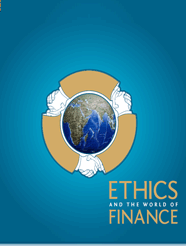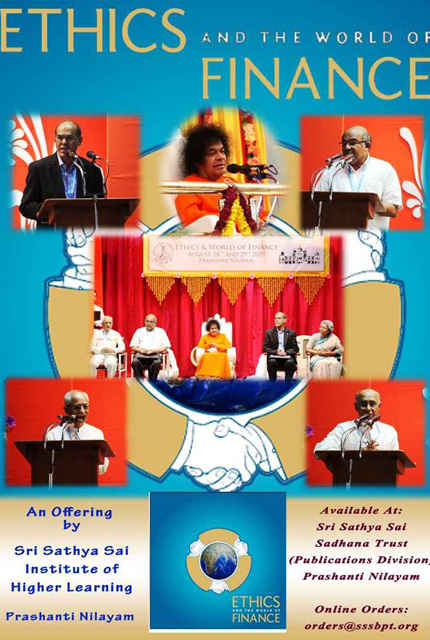ETHICS AND THE WORLD OF FINANCE
AN OVERVIEW OF THE BOOK
ETHICS AND THE WORLD OF FINANCE
A Compilation based on the
“Conference on Ethics and the World of Finance”
Sri Sathya Sai Institute of Higher Learning,
August 28-29, 2009
The conference was a unique event; it was the first time ever that more than 30 top executives from India’s financial sector came together and talked frankly and forcefully for two full days on a wide variety of problems facing them, their institutions and broadly the world of finance. There were the highest authorities representing regulating institutions like the Reserve Bank of India (RBI), the Securities and Exchange Board of India (SEBI) and the Insurance Regulating and Development Authority (IRDA). In addition, more than 25 heads of reputed national and international commercial banks, as well as several highly recognized management experts and economists who have been watching and analyzing the latest developments in the world of finance from their academic towers attended the conference.
The book that presents the addresses and panel discussions is, if not unique, then certainly unusual in both content and form and is far removed from typical conference proceedings. The six addresses/lectures, although brief, are packed with challenging reflections on the relationships between ethics and finance. The five panel discussions are presented in a manner that enables the reader to grasp the many-faceted aspects of these relationships, as seen from some of India’s most knowledgeable participants in and observers of the world of finance. And from an aesthetic perspective, the book is a joy to look at and read.
Adding to the uniqueness of the conference was the fact that it was inaugurated by Bhagawan Sri Sathya Sai Baba, Revered Chancellor, Sri Sathya Sai Institute of Higher Learning, whose valedictory address, “Uphold Ethics and Morality” is the opening ‘chapter’ in the book. The advice delivered was not only to the distinguished participants, faculty members and students of the Institute but also to all who seek guidance as to righteous behaviour. It provided simple but definitive answers to the queries, doubts and dilemmas considered during the course of the conference. Drawing from episodes of the ancient Indian Sanskrit epic, the Mahabharata, and relating one of the protagonist’s weakness for gambling, Bhagawan Baba explained why one must single mindedly stick to the highest Dharmic principles with commitment and faith.
The second presentation in the book, “Mahabharata to Meltdown” by Prof. Vishwanath Pandit, Vice Chancellor, Sri Sathya Sai Institute, commences by reflecting on the address by Bhagawan Baba. Thus, it was prepared after the completion of the conference and thereby provides a synthesizing overview of the whole conference as well as a thought provoking appetizer for the book. It outlines the way financial markets work and how this differs considerably from other markets, making them vulnerable to potentially disastrous outcomes, particularly as the problems faced get more complex and more hazardous in a regime of globalization. Thus, by deviating from the normal proceedings of conferences whereby papers typically are presented in chronological order, the book opens in a most inviting and unorthodox manner. After these two introductory ‘chapters’, the book presents the addresses in their chronological order.
The Keynote Address, “World of Faith and Economic Development are Intertwined”, presented by Dr. Duvvuri Subbarao, Governor, Reserve Bank of India, is the third contribution in the book. The Governor underscored why the fields of economics and finance, both in theory and in practice, need to draw upon their ethical and moral foundations if prosperity is to be sustainable and justly distributed. “The worlds of faith and economic development”, he stated, “are profoundly intertwined, in both precept and practice. At heart, the strongest link is the aim to foster greater social justice.” He emphasized the issue of moral hazard in the banking system whereby profits are privatized while costs are socialized and that globalization had considerably enlarged the extent of these costs once things go wrong.
The Invited Lecture, “World of Finance” by Dr. Yaga Venugopal Reddy, former Governor, Reserve Bank of India, traced how the financial collapse that engulfed the world had taken place primarily as a result of misguided policies in the United States, policies that were based on unfounded and unrealistic assumptions regarding risk. Fortunately for India, the damage that it suffered was small as a result of well designed and cautiously implemented policies. Dr. Reddy observed that while “there are failures on multiple fronts and there are multiple failures that led to the crisis … in my view the nebulous area of morals, values and ethics offers the explanation.”
The lecture “Translating Truth into Action” by Mr. S. V. Giri, former Central Vigilance Commissioner of India and former Vice Chancellor, Sri Sathya Sai Institute of Higher Learning, followed up on this perspective by emphasizing why ethical principals must be integrated into the practices and world-views of the leaders of financial institutions. In particular, and with reference to the issues raised by the first two speakers, he underscored why fundamental and universal human values “must be complementary to all codes and legal frameworks”. How this could be achieved, he emphasized, was illustrated with the way the system of integral education is implemented at Sri Sathya Sai Institute of Higher Learning where the dictum is “Discipline is the medium of instruction and the first, second and third languages are love, service and Sadhana (spiritual practice).”
Deliberations at the conference were organized into four panel discussions and a plenary session. The first panel discussion: “Governance and Regulation” was moderated by Mr. K. V. Kamath, Chairman, ICICI Bank, who underlined that “… We need to understand and highlight the problems that regulators are facing in dealing with the challenges the present situation has thrown up”. The session achieved a consensus regarding the financial sector that “only ethical behavior can sustain the businesses in the long run.”
The second panel discussion on “Individual Financial Institutions” was moderated by Mr. Uday Kotak, Executive Vice Chairman and Managing Director, Kotak Mahindra Bank. The discussion provided a perspective on problems from the point of view of individual institutions and the difficulties that they face in identifying and dealing with moral issues. In his summing up, Mr. Kotak emphasized the session’s conclusion that “the same value system that is followed by a person in a family should be brought to the firm in the interests of fostering ethics and values therein. … India has a great opportunity in the financial system not only to stand out, take on the challenges like financial inclusion which are on the country’s development agenda, but also to progress as one of the finest financial systems in the world, where we live by our values and conviction.”
The third panel discussion, “The Quintessence of Morality and Ethics”, was moderated by the reputed scientist and former Vice Chancellor of the Institute, Prof. G. Venkataraman. The session went deeper into the basic rules of the game of life and how a violation of these basic rules has led to the multifarious problems that face humanity today. The session built on the views expressed in the two preceding panel discussions and highlighted that while issues relating to finance and the economy are highly visible as they affect vast numbers all across the globe, the problems are also very deep and need to be understood as such. This led the session moderator to state that “… in the present climate, issues revolving around economics and finance are too important to be discussed by the specialists of these branches alone.”
The fourth and final panel discussion “Government and the Education System” was moderated by Mr. S. V. Giri who has had a long lasting involvement with both government and education. The moderator emphasized that the basic solutions to the problems that were considered during the conference consist of governance (in particular the policy framework of government and the responsibility of the self-regulating agencies and social institutions) as the immediate strategy, and, for the longer run, a system of education which promotes the inculcation of human values. The basic presumption was that true education is the necessary component of any solution one may envisage.
The plenary session, “The Hindsights” was chaired by Prof. Vishwanath Pandit, an economist of international renown and the Vice Chancellor of the Institute at the time of the conference. With the active participation of the panelists he synthesized and summed up the intense deliberations and delineated which additional issues needed to be taken up more explicitly. In particular, he emphasized the role of information, including the critical questions: “How information is acquired, how it is dispensed with and even manipulated, and how it is used” and that “the moral guidelines that must be followed in this context are vital to how an economy functions and how millions of human beings are affected.”
The book concludes with the paper, “The Road Map Ahead”, by Mr. Vijaya Bhaskar, Regional Director, Reserve Bank of India, Bangalore and an alumnus of Sri Sathya Sai College, Brindavan. Mr. Bhaskar succinctly synthesizes what one can ultimately learn from the conference and reflects on how these insights can be put into practice. In particular, he underscores how the vital link between ethics and finance can and will affect the future of India if its institutional leaders draw upon the nation’s heritage: “India, by virtue of its incredibly rich cultural and spiritual history, could emerge as a role model for other countries of the world if it were to follow its ancient moral and spiritual path – the Dharmic way.”



